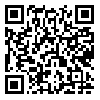Volume 19, Issue 60 (4-2025)
MLJ 2025, 19(60): 524-535 |
Back to browse issues page
Download citation:
BibTeX | RIS | EndNote | Medlars | ProCite | Reference Manager | RefWorks
Send citation to:



BibTeX | RIS | EndNote | Medlars | ProCite | Reference Manager | RefWorks
Send citation to:
Karimi A, Abbas Karimi1 , Seyed Omid Moosavi2 A K , S O M. The conflict between Farash's Rule and Genetic
Testing in the Diagnosis of Ancestry. MLJ 2025; 19 (60) :524-535
URL: http://ijmedicallaw.ir/article-1-1845-en.html
URL: http://ijmedicallaw.ir/article-1-1845-en.html
1- Department of Private and Islamic Law, Faculty of Law and Political Science, University of Tehran, Tehran, Iran.
2- Department of Jurisprudence and Law, Shahid Motahari University, Tehran, Iran.
2- Department of Jurisprudence and Law, Shahid Motahari University, Tehran, Iran.
Abstract:
Background and Aim: Contrary to the proof of the mother-child relationship, which is not so difficult due to the consideration and registration of the birth event, the proof of the father-child relationship (Obovat and Bonovat) has created special difficulties in the world of law and court cases due to the secrecy of its origin. For this reason, the legislator has adopted a rule known as Farash rule in accordance with Imamiyah jurisprudence to determine the ancestry of a born child and has specifically mentioned it in Articles 1158 and 1159 of the Civil Code. This research examines the position of this rule as a legal rule in conflict with the scientific reason of genetic testing as a judicial rule in determining ancestry.
Method: This research is of a theoretical type, the research method is descriptive-analytical, and the collection of information is library-based by referring to books.
Ethical Considerations: In all stages of writing the present research, while respecting the originality of the texts, honesty and trustworthiness have been observed.
Results: Although Farash's rule has been presented by the legislator as a solution to the problem of determining ancestry, it should be known that due to the non-exclusiveness of evidence to prove ancestry, the nature and place of precise scientific methods such as genetic testing in determining ancestry is significant and legal review. The general ruling in the conflict between the legal evidence of the mattress and the judicial evidence of genetic testing is to prioritize the judicial evidence over the legal evidence.
Conclusion: If the result of the genetic test in the case of ancestry detection conflicts with the application of the Farash rule, it will take precedence over the Farash rule which is a legal rule, considering the nature of this scientific reason, which is reassuring and a judicial finding.
Please cite this article as:
Karimi A, Moosavi SO. The conflict between Farash's Rule and Genetic Testing in the Diagnosis of Ancestry. Medical Law Journal. 2025; 19: e34.
Method: This research is of a theoretical type, the research method is descriptive-analytical, and the collection of information is library-based by referring to books.
Ethical Considerations: In all stages of writing the present research, while respecting the originality of the texts, honesty and trustworthiness have been observed.
Results: Although Farash's rule has been presented by the legislator as a solution to the problem of determining ancestry, it should be known that due to the non-exclusiveness of evidence to prove ancestry, the nature and place of precise scientific methods such as genetic testing in determining ancestry is significant and legal review. The general ruling in the conflict between the legal evidence of the mattress and the judicial evidence of genetic testing is to prioritize the judicial evidence over the legal evidence.
Conclusion: If the result of the genetic test in the case of ancestry detection conflicts with the application of the Farash rule, it will take precedence over the Farash rule which is a legal rule, considering the nature of this scientific reason, which is reassuring and a judicial finding.
Please cite this article as:
Karimi A, Moosavi SO. The conflict between Farash's Rule and Genetic Testing in the Diagnosis of Ancestry. Medical Law Journal. 2025; 19: e34.
Type of Study: Original Article |
Received: 2024/07/14 | Accepted: 2025/07/14
Received: 2024/07/14 | Accepted: 2025/07/14
Send email to the article author
| Rights and permissions | |
 |
This work is licensed under a Creative Commons Attribution-NonCommercial 4.0 International License. |






